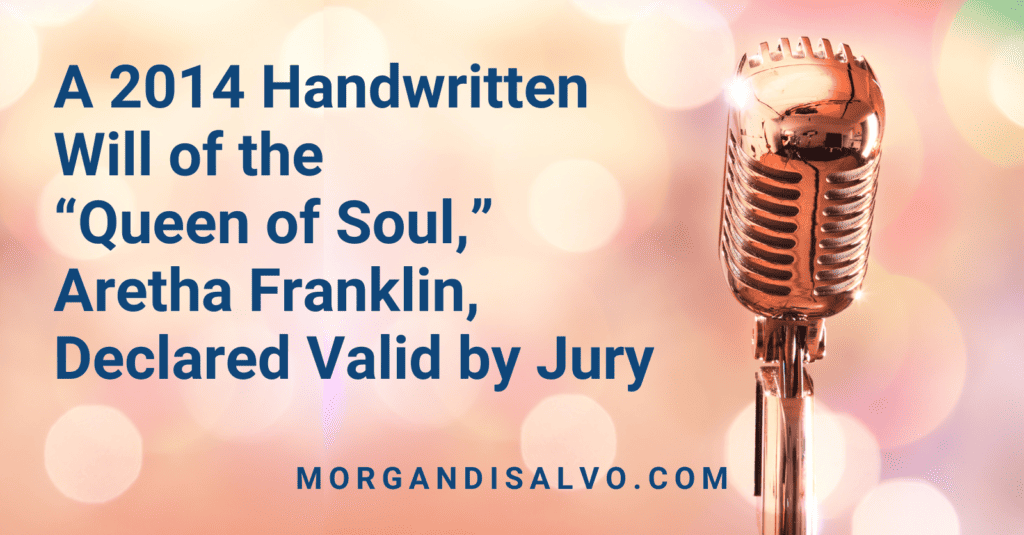by Allison L. Byrd, Morgan & DiSalvo, P.C.
 The estate of Aretha Franklin became the center of a family dispute after the “Queen of Soul” died in her Michigan home on August 14, 2018, at the age of 76. Franklin was initially thought to have died without a will or trust in place to guide the disposition of her sizeable estate. However, in May of 2019, hand-written documents that appeared to be wills were found in the singer’s Michigan home. Over the last four years, a legal battle between three of Franklin’s four sons has played out in the Oakland County Probate Court over two of those wills — one dated 2010 and found in a locked cabinet, and one dated 2014 and found tucked under the cushions of a couch. Both documents were signed and dated, though the 2014 document includes a smiley face that appears to take the place of Ms. Franklin’s first initial. Neither of the documents was witnessed, though the 2010 document was notarized, and each document provides for a different disposition of Franklin’s property among her four children. Not surprisingly, a family dispute ensued as to the validity of the documents.
The estate of Aretha Franklin became the center of a family dispute after the “Queen of Soul” died in her Michigan home on August 14, 2018, at the age of 76. Franklin was initially thought to have died without a will or trust in place to guide the disposition of her sizeable estate. However, in May of 2019, hand-written documents that appeared to be wills were found in the singer’s Michigan home. Over the last four years, a legal battle between three of Franklin’s four sons has played out in the Oakland County Probate Court over two of those wills — one dated 2010 and found in a locked cabinet, and one dated 2014 and found tucked under the cushions of a couch. Both documents were signed and dated, though the 2014 document includes a smiley face that appears to take the place of Ms. Franklin’s first initial. Neither of the documents was witnessed, though the 2010 document was notarized, and each document provides for a different disposition of Franklin’s property among her four children. Not surprisingly, a family dispute ensued as to the validity of the documents.
On July 11, 2023, after a two-day trial and less than one hour of deliberation, a six-person jury found that the 2014 document meets the Michigan state law requirements for a “holographic” will – a will that is hand-written by the testator (the person making the will), though not witnessed. According to Michigan law, a holographic will is valid “if it is dated, and if the testator’s signature and the document’s material portions are in the testator’s handwriting.” Michigan Compiled Laws 700.2502.
Georgia, on the other hand, does not recognize holographic Wills. In Georgia, a Will must be in writing (typed or hand-written), signed either by the testator or by someone who is signing for the testator in the testator’s presence and at the testator’s express direction, freely and voluntarily executed by a testator who is legally competent and at least 14 years of age, and witnessed by at least two legally competent individuals who are also at least 14 years of age. The witnesses and the testator (or the person signing for the testator) must all sign the Will in each other’s presence. Since Franklin’s 2014 hand-written Will was not witnessed, it would not have been recognized as valid under Georgia law.
In addition to souring sibling relationships, Franklin’s poor estate planning will likely cause her estate to be liable for substantial estate and income taxes, significantly reducing the wealth that her beneficiaries will ultimately inherit.
The take-away? You don’t have to be musical royalty in order to benefit from a well-structured estate plan, prepared by a knowledgeable and competent estate planning attorney. With proper estate planning, you can minimize the chances of a family dispute after your death, minimize administrative costs and hassles, reduce or eliminate exposure to estate and income taxes, and keep the details of your assets private. And that’s something to sing about!
The estate planning attorneys at Morgan & DiSalvo, P.C. are available to advise clients on the best estate planning options available. Call (678) 720-0750 to schedule a confidential estate planning consultation.




